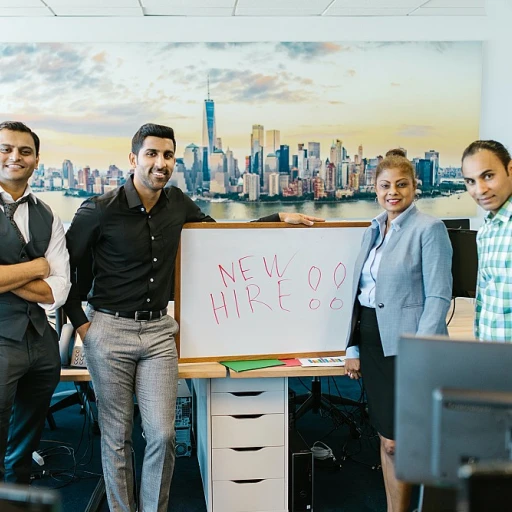Understanding the CHRO Role
Examining the Chief Human Resources Officer's Influence
The role of a Chief Human Resources Officer (CHRO) is pivotal within any organization, as it serves as a linchpin connecting human capital and strategic business goals. Understanding the CHRO's role involves more than acknowledging its responsibilities; it encompasses recognizing the profound influence this position holds in shaping a company's future.
CHROs are tasked with aligning human resources strategies with the broader corporate objectives. This alignment ensures that the organization's talent and workforce are in harmony with its mission and values, setting the stage for sustainable growth and success. As explored in
the art of strategic planning for CHROs, effective strategic planning is a crucial aspect of a CHRO's role, demanding a comprehensive understanding of both current and future HR needs.
The CHRO is often seen as a strategic partner to the CEO and other senior leaders, providing insights on workforce trends, employment engagement, and organizational development. This partnership is vital in navigating the complexities of talent management and fostering a robust workplace culture, intrinsic elements that significantly impact an organization's success. Furthermore, in shaping leadership strategies, the CHRO ensures that the workforce is agile and resilient, ready to meet emerging challenges and seize opportunities.
Essential Leadership Skills for CHROs
Critical Communication: The Backbone of CHRO Leadership
Being a successful Chief Human Resources Officer requires more than just an understanding of human resources functions. At the heart of effective leadership within this role is communication. CHROs must master the art of delivering clear, concise, and persuasive messages across various levels of an organization. Whether communicating policy changes, negotiating with stakeholders, or conducting an all-hands meeting, the ability to articulate ideas effectively is paramount.
Furthermore, active listening is equally crucial. CHROs should build trust by genuinely engaging in conversations, considering diverse perspectives, and fostering an environment where team members feel valued and heard. Crafting strategies for open dialogue and transparent communications can significantly impact and support the overarching goal of a strong workplace culture.
Strategic Thinking: Aligning HR Initiatives with Business Goals
Strategic thinking is a key competency for CHROs aiming to drive organizational success. CHROs are tasked with ensuring that HR initiatives are not only aligned with the company's vision and mission but also support strategic business objectives. Decision-making in this role should be influenced by a comprehensive understanding of how every HR initiative contributes to the broader business landscape.
Incorporating strategic HR leadership into day-to-day activities involves staying informed about market trends, assessing potential risks, and leveraging data-driven insights to make informed decisions. CHROs who successfully navigate this complexity often serve as critical allies to C-suite peers, contributing to strategic planning and operational efficiency. For more details on mastering the art of HR leadership for business success, follow
this link.
The Importance of Talent Management
Building a Strategic Approach to Talent Management
In the dynamic landscape of human resources, the role of a Chief Human Resources Officer (CHRO) demands not just a strategic mindset, but also a focus on the pivotal asset of any organization: its people. Talent management is at the core of driving business performance and is a critical component of successful leadership for any CHRO.
To excel in talent management, CHROs must first cultivate an in-depth understanding of the company's strategic objectives. This means aligning talent strategies with the wider goals of the organization, ensuring that every recruitment, development, and retention decision supports the overarching mission. An effective CHRO views talent management as a continuous process rather than a one-off project, emphasizing the importance of proactive planning to meet current and future business needs.
An essential skill for CHROs in this area involves the identification and nurturing of potential leaders within the workforce. This requires a keen ability to recognize diverse talent and provide these individuals with opportunities to develop their skills and capabilities through targeted leadership programs and career development pathways. The role of a CHRO in talent development is not just to fill immediate gaps but to prepare the organization for long-term success by building a robust talent pipeline.
Moreover, fostering an inclusive and engaging work environment is fundamental to effective talent management. A positive workplace culture that supports diversity and inclusion can not only attract top talent but also enhance employee engagement and retention. CHROs need to champion initiatives that create a sense of belonging and purpose, reinforcing the company’s commitment to its people and values.
Navigating through numerous employment laws and regulations, as discussed earlier, is also crucial in crafting fair and compliant talent management practices. Ensuring that these policies are transparent and communicated effectively across the organization fosters trust and encourages open dialogue between HR and employees.
In conclusion, while mastering the art of leadership and organizational culture is key, having a strategic and human-centered approach to talent management is what truly differentiates successful CHROs. Their ability to drive organizational growth through effective talent strategies builds a competitive edge that can't be underestimated.
Fostering a Positive Workplace Culture
Cultivating an Inclusive and Supportive Environment
Creating a workplace culture where employees feel valued and engaged is a fundamental responsibility for Chief Human Resources Officers. This involves fostering an environment that encourages open communication, recognizes diversity and inclusion, and promotes employee well-being. An inclusive workplace culture not only enhances job satisfaction but also drives business success by harnessing a variety of perspectives and ideas.
CHROs play a critical role in setting the tone for organizational culture, often acting as the bridge between management and employees. By championing initiatives that support workplace diversity and encouraging policies aimed at equity, CHROs help build a more cohesive and productive work environment. This aligns closely with the essential leadership skills required for CHROs, where emotional intelligence and the ability to manage diverse teams lay the foundation for a thriving workplace.
Moreover, an open-door policy can be instrumental in cultivating transparency and trust. By actively listening to employee feedback and addressing concerns promptly, CHROs can ensure that the workplace remains a positive and supportive space. Encouraging team-building activities and providing platforms for employee recognition are also effective strategies for strengthening the workplace culture.
Ultimately, a positive workplace culture is linked to talent management as it plays a vital role in attracting and retaining top talent. When employees feel included and appreciated, they are more likely to stay with the company and contribute to its success. This focus on culture can significantly impact succession planning and leadership development, ensuring a steady pipeline of capable leaders ready to step up when needed. By integrating these elements into their leadership approach, CHROs can effectively influence the overall success of their organizations.
Navigating Employment Laws and Regulations
Clarity on Employment Laws and Regulations
Navigating the labyrinth of employment laws and regulations is a crucial leadership skill every Chief Human Resources Officer (CHRO) must hone. As CHROs, understanding and managing these complexities not only ensures legal compliance but also fosters a fair and equitable workplace. The significance of this expertise connects directly to promoting a positive workplace culture, as discussed in our previous segment.
CHROs are met with the challenging task of remaining abreast of changing employment laws and regulations that vary significantly across different regions and industries. Such constant evolution requires these leaders to be proactive in their learning and receptive to external advice when needed. Regular participation in professional workshops, subscribing to updates from reliable legal resources, and establishing a robust network of legal experts are vital practices for staying informed and compliant.
Moreover, the ripple effects of compliance extend beyond avoiding legal penalties. A CHRO well-versed in the regulatory landscape provides the organization with a strategic advantage, fostering trust among employees and maintaining the company's reputation. Building a solid foundation in employment laws leads to healthier talent management practices, which in turn ties into effective leadership development and succession planning.
Understanding legal constraints also aids in the proactive anticipation of potential challenges. CHROs can work closely with other executives to tailor strategies that align with regulatory demands while advancing organizational goals. With careful planning and insight, employment laws become a backdrop against which innovative and ethical human resource strategies can thrive. This proactive approach justifies the need for continuous skill enhancement among HR leaders, a theme that is central to mastering HR leadership for business success.
Leadership Development and Succession Planning
Strengthening Future Leadership
In the ever-evolving role of a Chief Human Resources Officer, one cannot overlook the significance of leadership development and succession planning. As discussed in earlier sections, understanding the nuances of employment laws and nurturing a vibrant workplace culture play a pivotal role in shaping a successful HR strategy. However, to ensure sustained growth and continuity, CHROs must also focus on identifying and grooming future leaders within their organization.
The first step in effective leadership development is recognizing the diversity and complexity of skills required at different levels of leadership. CHROs should work closely with other senior leaders to identify potential candidates who not only display leadership potential but also align with the company’s values and mission. This involves creating robust talent assessment programs, which can help in identifying high-potential employees who are ready to take on more challenging roles.
Once potential leaders are identified, it is crucial to provide them with the necessary training and mentorship. This might entail formal training programs, experiential learning opportunities, or even one-on-one mentoring with established leaders within the organization. By investing in comprehensive leadership development initiatives, CHROs can ensure that these future leaders are well-equipped to navigate the complexities of the business world.
Succession planning is equally vital, as it ensures that there is a seamless transition of leadership roles with minimal disruption to the organization's operations. Effective succession planning requires a strategic approach where CHROs, along with executive management, proactively create a pool of qualified internal candidates ready to step into critical positions as they become vacant. This strategic foresight not only mitigates risks associated with sudden leadership gaps but also fosters a culture of continuous growth and achievement.
In conclusion, the role of a CHRO extends beyond managing the present workforce. By focusing on leadership development and thoughtful succession planning, CHROs can play a transformative role in their organizations, ensuring sustained success and adaptability in the face of future challenges.








